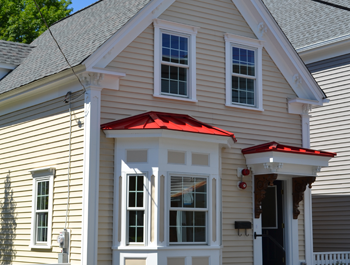Image

Robert Tourigny, Executive Director of NeighborWorks Southern New Hampshire
Challenge: The West Granite neighborhood of Manchester, NH was full of abandoned properties and even occupied properties were in serious disrepair in 2008. In addition, a neighborhood survey revealed that residents felt unsafe. The neighborhood needed reinvestment to clean up the buildings and instill a sense of neighborhood pride.
The neighborhood of West Granite in Manchester, NH was already troubled in 2006 when the property tax rate for multifamily homes skyrocketed. The following year oil prices tripled and in 2008 the housing crisis and recession hit, causing many landlords to abandon their properties. Diane Bourque, a resident of West Granite, says the neighborhood went from bad to worse beginning in the spring of 2006.
"That was when someone threatened to shoot my daughter," she says. "That was the height of the trouble in the neighborhood. People were selling drugs and there were fights in the street."
That summer the Manchester Police Department asked Bourque to start a neighborhood watch group. And that fall, she joined the Community Services Committee of NeighborWorks Southern New Hampshire along with other concerned neighbors and property owners recruited by our organization to address quality-of-life issues. They soon identified West Granite as one of Manchester's most troubled areas and started to lay groundwork for greater investment in the area. They addressed everything from trash and graffiti to negligent property owners and helped organize neighborhood cleanups and block parties.
The challenges were acute: In 2008, 77 percent of residents rented and two-thirds of their landlords lived outside the neighborhood, according to a committee survey. The vacancy rate was around 25 percent, compared to eight percent for Manchester as a whole. Only nine percent of those surveyed felt the condition of their neighbor's homes added value to their own.
The lack of investment was exacerbated by the 2008 housing crisis. Outside of a few dedicated residents fighting against the decay, the neighborhood was characterized by vacant buildings, rising crime rates and declining property values.
NeighborWorks Southern New Hampshire supported Bourque's neighborhood watch and helped a local pastor organize a community center for kids and other residents.
 "Pastor Rich Clegg and Assistant Pastor Matt Hasty, who led Grace Haven Baptist Church, a small storefront church on the corner of Granite and West streets, made our efforts to organize in that community much easier," said Will Stewart, a former community building specialist for NeighborWorks Southern New Hampshire. "Their relationships with residents were critical in helping us establish trust and credibility in the neighborhood. Additionally, Rich and Matt were very generous with their space, allowing the church to be used as a staging ground for everything from neighborhood block parties to nonpartisan voter registration efforts."
"Pastor Rich Clegg and Assistant Pastor Matt Hasty, who led Grace Haven Baptist Church, a small storefront church on the corner of Granite and West streets, made our efforts to organize in that community much easier," said Will Stewart, a former community building specialist for NeighborWorks Southern New Hampshire. "Their relationships with residents were critical in helping us establish trust and credibility in the neighborhood. Additionally, Rich and Matt were very generous with their space, allowing the church to be used as a staging ground for everything from neighborhood block parties to nonpartisan voter registration efforts."Both Bourque and Clegg served extended terms as committee members and moved to the organization's Board of Directors.
In addition to these grassroots efforts, NeighborWorks Southern New Hampshire targeted several properties on the West Side for reclamation and revitalization. One property in particular, 414 Granite Street, was a real problem.
"At some hours of the day the place right across from the church was like a McDonald's drive thru with the amount of people coming in and out buying drugs," Clegg recalls. "When you take properties which are full of crime and absolute filth and turn them into some of the nicest around, you change the feel of the entire neighborhood. These were once scary, unwelcoming places, and now when you drive by you might see the property owner out working on the yard or his kids out playing in the snow. That is how you change attitudes and begin to turn things around."
Over the next seven years, NeighborWorks Southern New Hampshire pooled more than $5 million from federal, municipal and corporate sources to revitalize the neighborhood and increase the homeowner occupancy rate. The deeds require owners to live in the properties, ensuring the purchasers and all future owners are committed to investing in their new community.
NeighborWorks Southern New Hampshire acquired 11 of the most blighted properties in the area, containing 32 of the city's worst rental units. Addressing the concerns of residents, we managed to reduce the density and increase off-street parking and open space in the neighborhood, leaving nine properties with a total of 21 units.
In addition, by eliminating one of these problem properties, we were able to create much needed additional parking at a nearby senior center. The reclamation of these neglected properties from havens for crime supported other neighborhood quality of life changes.
In 2013, the Community Services Committee conducted another survey of the neighborhood: Two-thirds of respondents said they would recommend the neighborhood to others and 75 percent said they had some satisfaction in their community.
The West Granite success occurred over time - the result of dedicated volunteers, funders and residents who care about their community, like Bourque and Clegg.
"It may seem like an easy thing to say now, but the fact is everything we have accomplished on the West Side is due entirely to the input we received from these passionate city residents," said Jennifer Vadney, neighborhood development manager for NeighborWorks Southern New Hampshire. "This kind of grassroots organization really guided us and it provides us with a great template as we look to continue our work in other neighborhoods."
We learned that engaging residents to improve their own community is essential to success.

